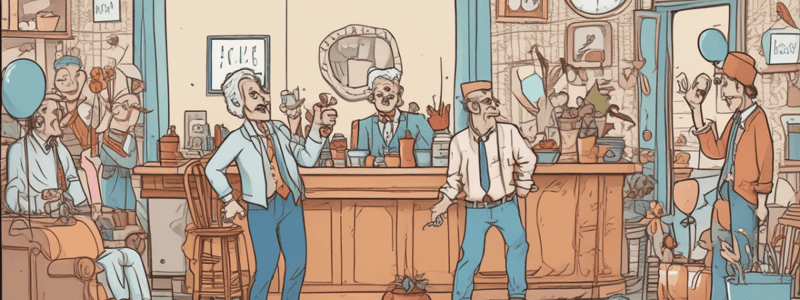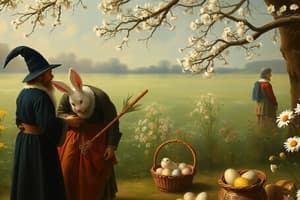Podcast
Questions and Answers
What is the origin of the term 'April Fish' for pranks played on April Fools' Day?
What is the origin of the term 'April Fish' for pranks played on April Fools' Day?
- It is a reference to the abundance of fish during the spring season.
- It is derived from the French term 'poisson d'avril' for an April joke.
- It refers to the practice of sticking paper fish on someone's back. (correct)
- It comes from the Scottish tradition of catching fish on April 1st.
What does the tradition of 'Hunt the Gowk Day' involve in Scotland?
What does the tradition of 'Hunt the Gowk Day' involve in Scotland?
- Hunting for a mythical creature called a 'gowk'.
- Celebrating the arrival of spring by decorating with gowk feathers.
- A day dedicated to practical jokes and hoaxes.
- Sending people on wild goose chases and playing pranks. (correct)
Which famous April Fools' Day prank is mentioned in the text?
Which famous April Fools' Day prank is mentioned in the text?
- The BBC reported on a bumper spaghetti harvest in Switzerland. (correct)
- A website claimed to have invented a perpetual motion machine.
- A social media influencer claimed to have been hired by NASA.
- A news outlet reported on the discovery of a new planet.
How have technological advancements impacted April Fools' Day pranks?
How have technological advancements impacted April Fools' Day pranks?
What is the overall tone of the text regarding April Fools' Day?
What is the overall tone of the text regarding April Fools' Day?
What is a common prank mentioned in the text involving April Fools' Day in France?
What is a common prank mentioned in the text involving April Fools' Day in France?
Why was it considered a prank for someone to have a cardboard fish on their back in medieval French society?
Why was it considered a prank for someone to have a cardboard fish on their back in medieval French society?
What famous April Fools' Day prank involved Swiss peasants and spaghetti according to the text?
What famous April Fools' Day prank involved Swiss peasants and spaghetti according to the text?
What was the satirical suggestion made by National Geographic in their April Fools' Day article from 1990?
What was the satirical suggestion made by National Geographic in their April Fools' Day article from 1990?
Why is April Fools' Day considered a tradition that fosters camaraderie and fun among people?
Why is April Fools' Day considered a tradition that fosters camaraderie and fun among people?
Flashcards are hidden until you start studying
Study Notes
April Fools' Day: A Day for Practical Jokes and Tomfoolery
April Fools' Day is celebrated every year on April 1 and it is marked by practical jokes, hoaxes, and general tomfoolery. The origins of this day are somewhat mysterious, but there are several theories that suggest how it came to be. One popular theory traces the roots of April Fools' Day back to 1582 when France switched from the Julian calendar to the Gregorian calendar, moving the celebration of the New Year from the end of March to January 1.
History
Although the precise origin of April Fools' Day is unknown, there are various myths and legends surrounding its creation. One of the theories states that the holiday originated in France in the late 16th century when people continued to celebrate the New Year according to the Julian calendar even after France had officially adopted the Gregorian calendar. These individuals were called "April fools" and became the butt of pranks and jokes on April 1. Another legend links April Fools' Day to the Roman festival of Hilaria, which was held at the end of March and involved dressing up in disguises and playing tricks on others.
Celebrations
Today, April Fools' Day is celebrated around the world with different customs and traditions. In many countries, including the United States, Canada, Australia, New Zealand, and South Africa, people exchange gifts and cards on this day. Some of the traditional April Fools' Day pranks include sticking paper fish on someone's back (known as the "April Fish"), sending people on wild goose chases, and telling elaborate hoaxes via fake news stories. In Scotland, April Fools' Day spans two days, with "Hunt the Gowk Day" on the first and "Tailie Day" on the second, where people play pranks such as pinning a tail or putting a "kick me" sign on someone's back.
Pranks and Traditions
The tradition of playing practical jokes and spreading hoaxes has carried over from the past. One famous historical prank occurred in 1957 when the BBC reported on a bumper spaghetti harvest in Switzerland, leading to numerous requests from confused viewers about how to grow spaghetti plants. More recent technological advancements have given rise to increasingly sophisticated April Fools' Day pranks, such as fake social media accounts and websites. Despite the potential downside of Internet-based pranks, April Fools' Day remains a day for light-hearted fun and mischief.
Studying That Suits You
Use AI to generate personalized quizzes and flashcards to suit your learning preferences.




